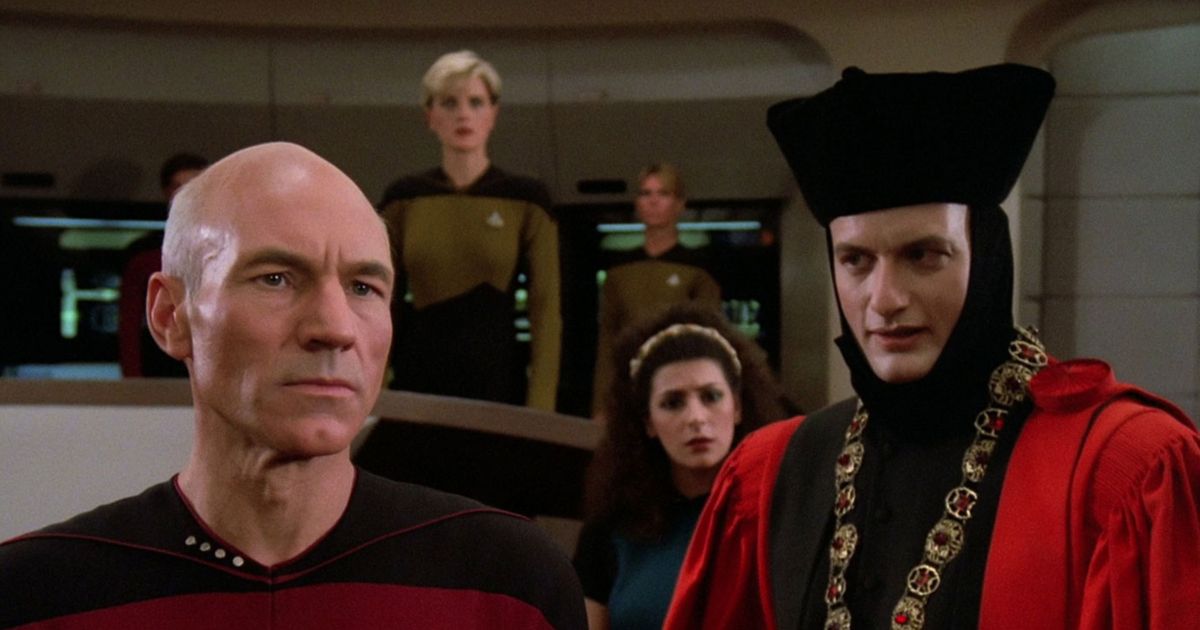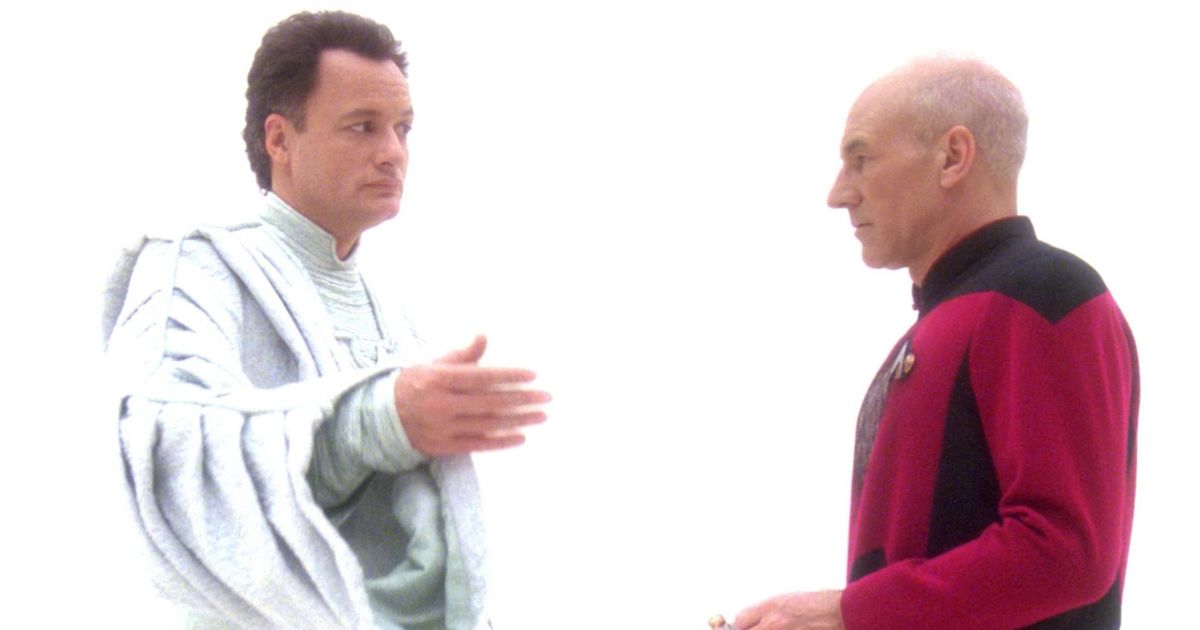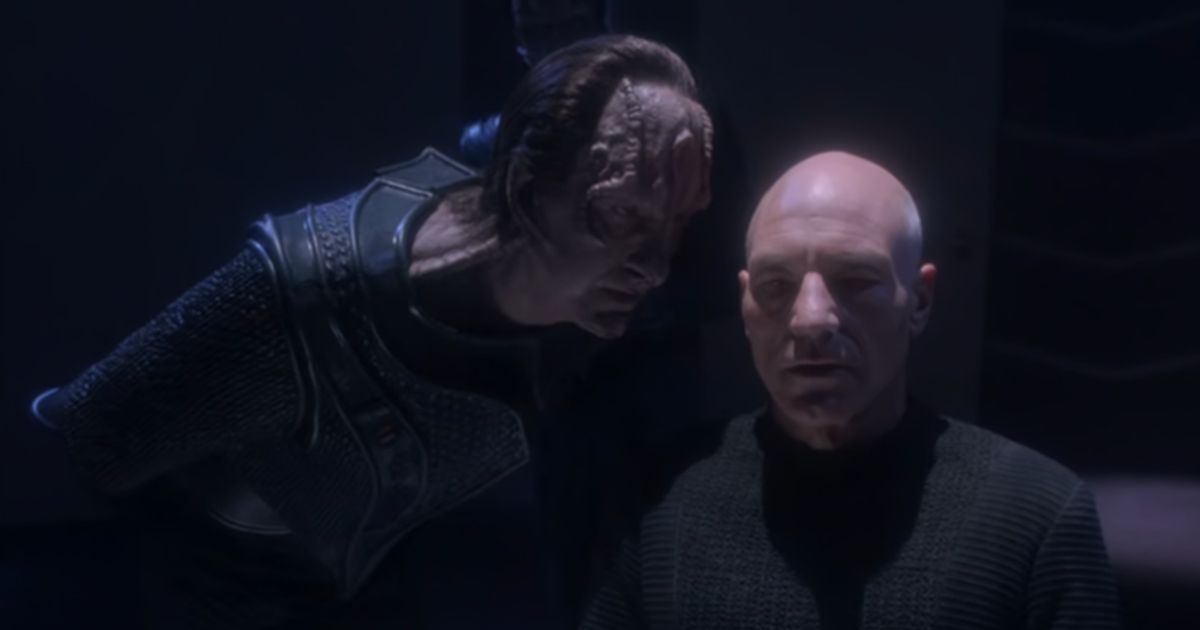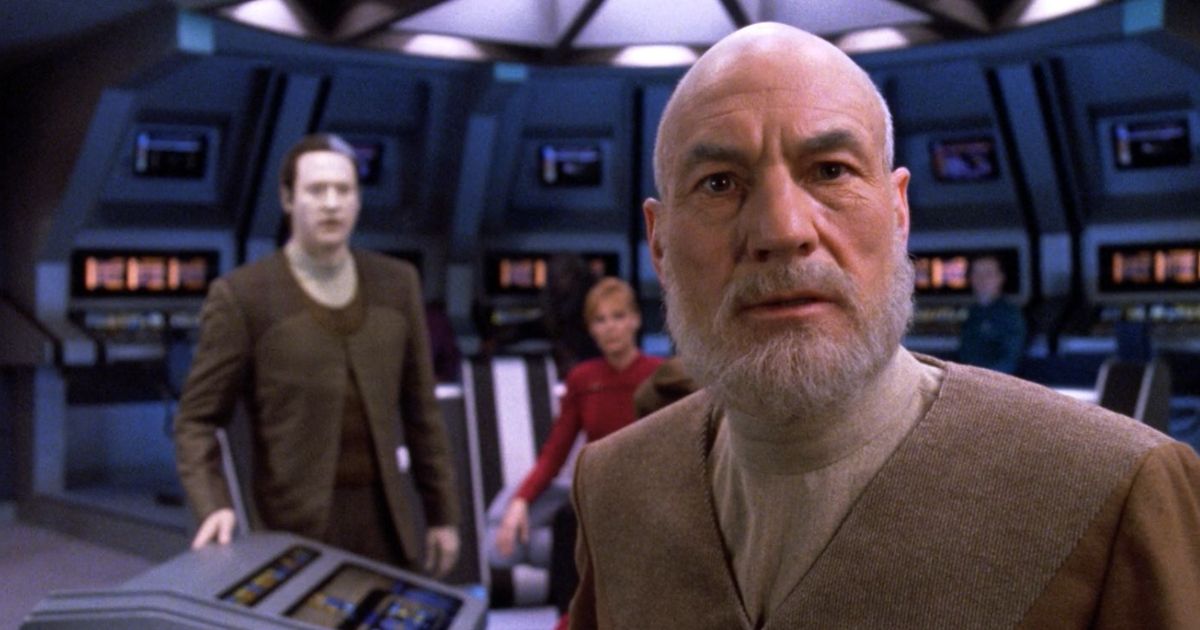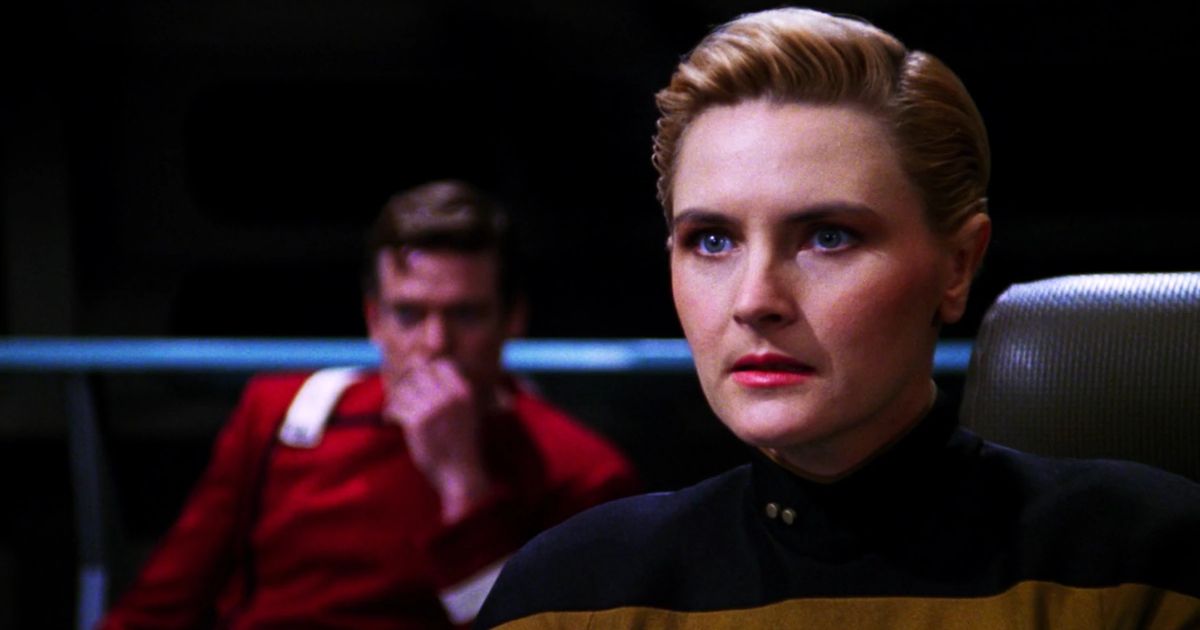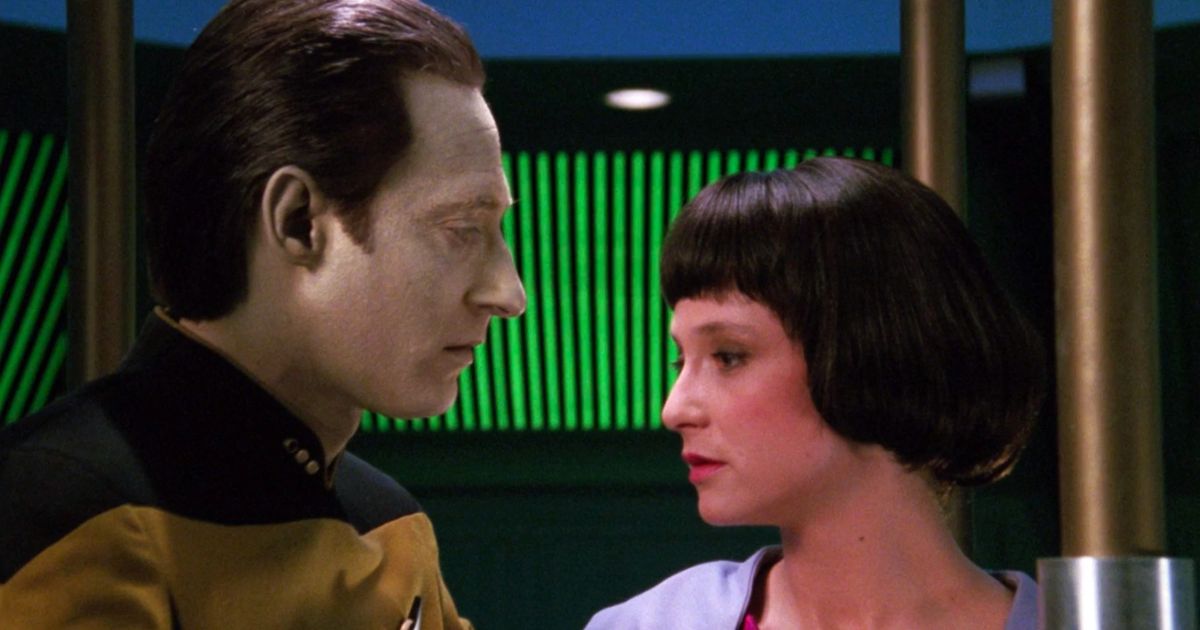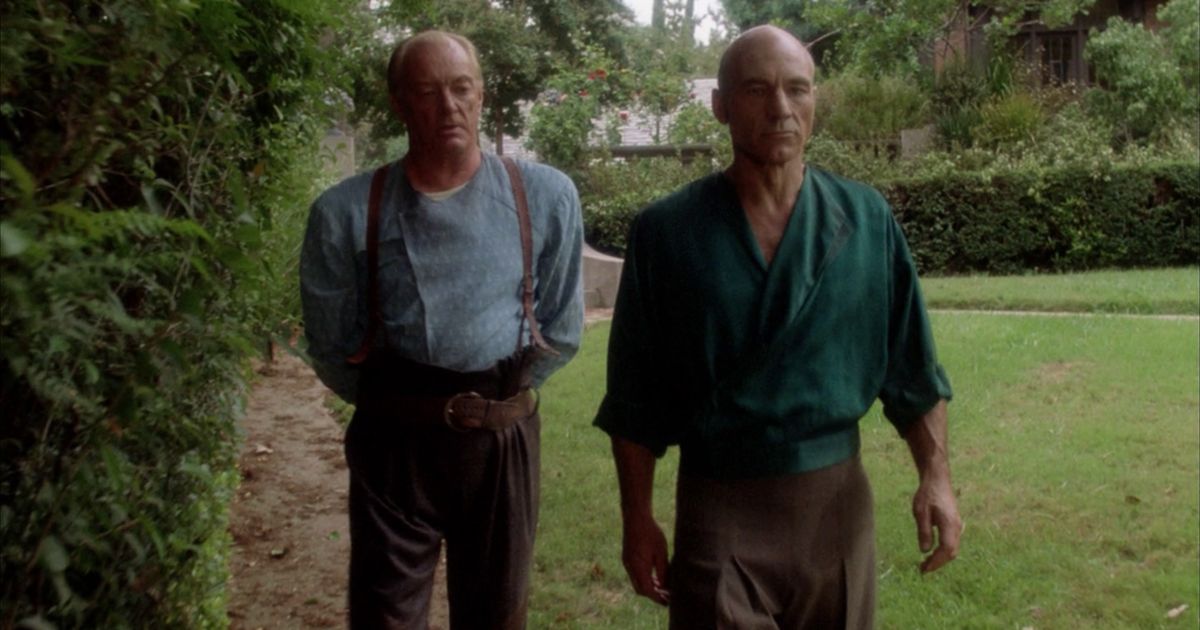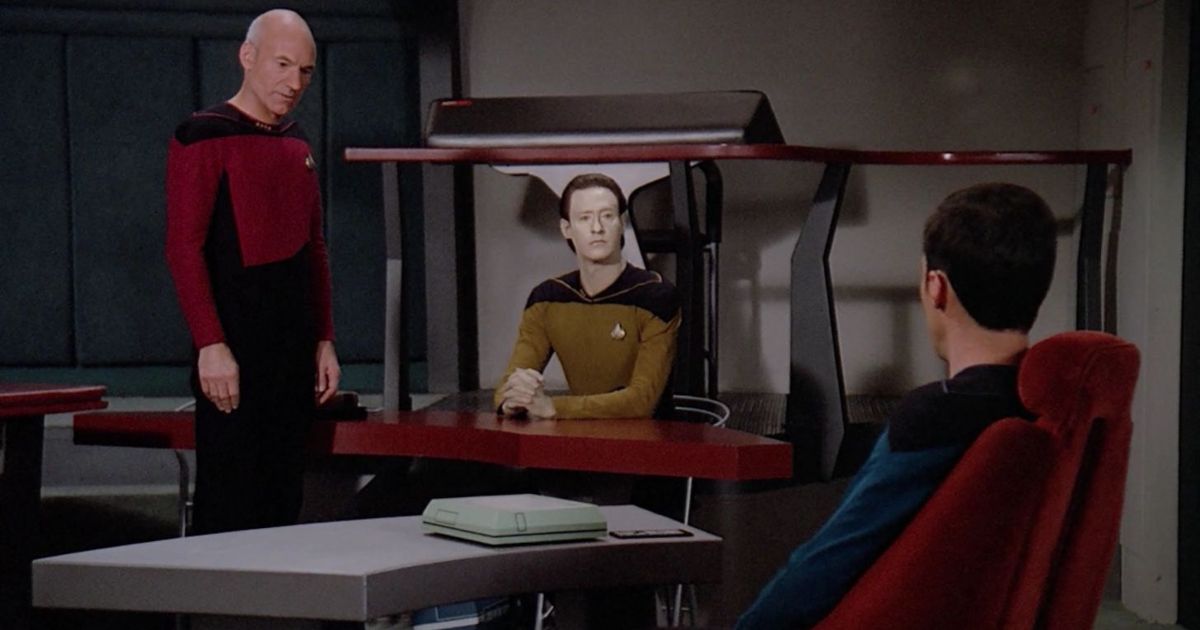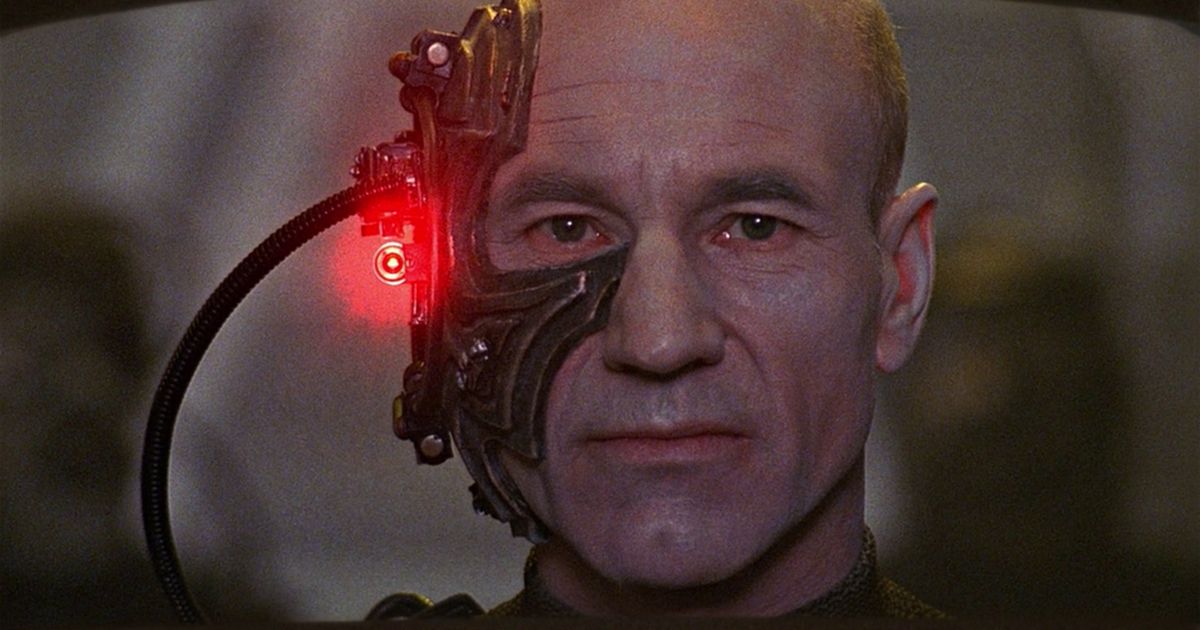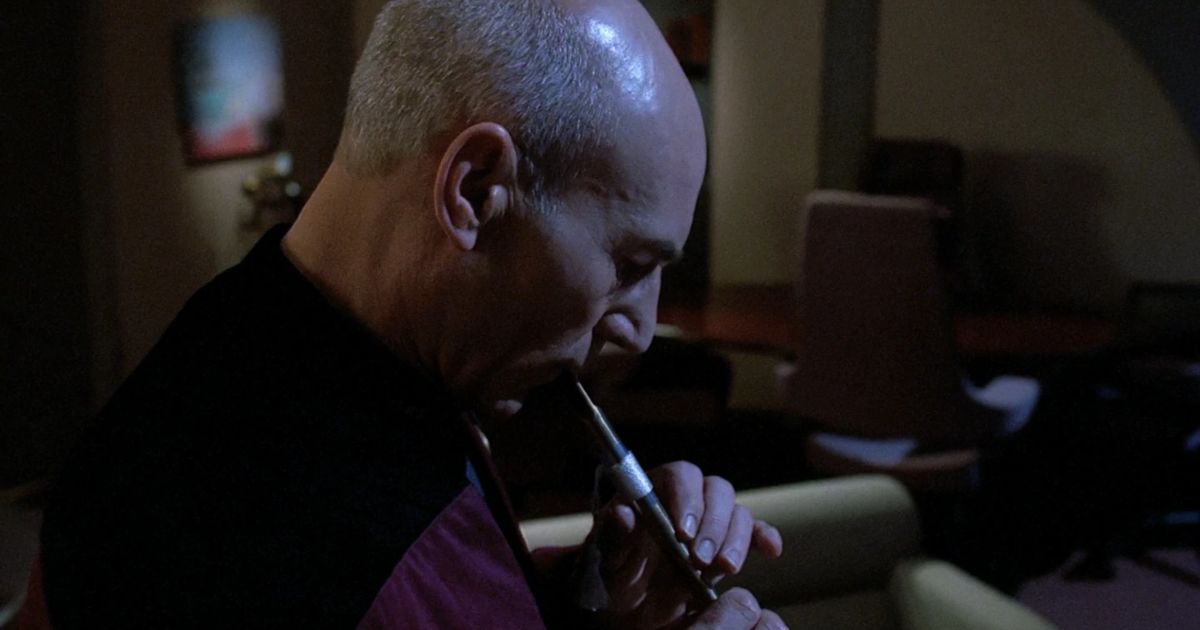These are the on-screen voyages of Star Trek, a now-massive and popular franchise with 13 movies and over 800 episodes and counting. Star Trek: The Original Series went off the air in 1969, and was followed by two decades of movies about those same characters. Yet it wasn't until the launch of the second TV series, Star Trek: The Next Generation, that we got to see new characters in this universe. Aptly named, Next Generation moved into the future from the original series, exploring new technology such as holodecks, and the universe-changing replicators, which could create almost any item you wanted in an instant.
As said in an article in the New Yorker, "It is hard to overstate how much of a departure the 'Star Trek' franchise's eighties-and-nineties-straddling incarnation, 'The Next Generation,' was from the original series." The show moved the Trek universe into a utopian future of post-scarcity. In one episode, for instance, Jean-Luc Picard, the current Captain of the starship Enterprise-D, tells a twentieth-century human concerned about his old stocks that, "People are no longer obsessed with the accumulation of things. We've eliminated hunger, want, the need for possessions. We've grown out of our infancy."
And that is the heart of the message of this show. Many of the best episodes have a more philosophical and intellectual bend to them, exploring deep ethical questions, explorations of justice, and what it means to be human. Yet some of the most beloved episodes are personal and emotional explorations of difficult subjects such as torture, loss of a loved one, or the effects of PTSD.
The Next Generation, or TNG as fans call it, has had a profound and lasting impact on how we see the Trek universe, the Federation, and creator Gene Roddenberry's vision for the future of humanity as a whole. It won two Hugo awards over its time on air, and remains one of the most memorable Trek shows to this day.
So which episodes from Star Trek: The Next Generation are the best?
10 "Encounter at Farpoint" - Season 1, Episode 1
The premier of Next Generation is a two-part episode that sets up the characters and the starship well, in spite of awkward wardrobe choices and a bit of a clunky feeling to it. But what it does best is frame the show around its central theme - exploring large philosophical questions about humanity. We also get introduced to one of the best side characters in all Star Trek, who would go on to appear in multiple different shows: the mysterious extra-dimensional being known as Q.
In this episode, Q appears on the ship and finds Captain Picard, a meeting that would begin a long and entertaining "friendship" between the two. Q takes Picard to be a representative of humanity, and puts the entire human race on trial, confronting him with the worst aspects of humanity, from the past to the present. Picard is put in the tricky and unenviable position of defending the history and present state of humanity, acknowledging the violent past, as well as fairly judging the struggle for humans to come out of that and into a better future. He ultimately succeeds, and shows us who he is, and the kind of world the Enterprise now exists in, in the process. It's philosophical Trek at its finest.
9 “Tapestry” - Season 6, Episode 15
The episodes with Q and Picard are certainly some of the best of the show, and this one is an excellent example of the ways that Q would challenge and even help Picard.
In this episode, Picard succumbs to a terrible injury, and is possibly dying. His consciousness drifts into an all-white world, where he finds Q - who immediately jokes around about him being in the afterlife. Q gives Picard an option to live, however, if he goes back to the past and makes one change in his life. The thing he has to change is to not get into a fight in a bar. It sounds simple enough, but the now-familiar "butterfly effect" sees that one change alter Picard's entire life. He wakes up in the present time and finds his life unrecognizable, and unremarkable.
The story is a profound and interesting lesson about the nature of regrets, a life well lived, and what it means to take risks. It was also the first time that writer Ronald D. Moore, one of the most prolific and exceptional writers on the show, got to write about the enigmatic Q.
8 “Chain of Command” - Season 6, Episodes 10 and 11
This two-part episode may be the darkest in the entire running of Next Generation. Featuring a new and terrifying enemy in the form of the Cardassians, the episode follows Picard as he is pulled into a covert mission that ends with him captured and mercilessly tortured. Patrick Stewart's performance is intense and chilling, as we watch him struggle to maintain his spirit and not break under the ruthless physical and psychological torture of the Cardassians. The episode sets up how nefarious they are, leading nicely into the new spinoff Star Trek: Deep Space Nine, where they are one of the main antagonists. It's rare to see any show, especially a 90s sci-fi show, go into such a dark topic as torture, and this episode does not shy away from it.
7 “All Good Things…” - Season 7, Episodes 25 and 26
The finale of the show was powerful, and is without a doubt the best Star Trek series finale ever, summing up the characters and the show with a loving reverence and heartwarming send-off.
The two-part episode is a complex story. It begins with Picard being bounced around in time - his consciousness slips between the past, before the Enterprise's first mission with him as captain; to the present of the show; to the future, where he is a retired old man, living on his family's vineyard in France. His disorientation is waved away as a symptom of a fatal neurological disease he is diagnosed with, but he insists that his time-jumps are real, and implores his crew to believe him. The fate of their universe, and all of their timelines, hangs in the balance.
Picard leans on the trust of his crew, asking them to have faith in him despite years apart in the future, or a lack of familiarity in the past. They come together in a moving, bittersweet ending that was both a love letter to fans, and a powerful goodbye to the cast and show, that USA Today called "picture perfect." The two-part episode also won a Hugo Award, and contributed to the show earning an Emmy for Outstanding Drama Series. Marvel Studios president Kevin Feige even cited it as a model for Avengers: Infinity War. No list of the best episodes of TNG would be complete without this finale.
6 “Yesterday's Enterprise” - Season 3, Episode 15
This episode features one of the best sacrifices we see in Star Trek, as well as a proper send-off for Tasha Yar, who had been too-quickly killed off in the first season. When another Enterprise (C) appears out of a temporal rift in space, we discover a different universe, in which the Federation is at war with the Klingons, and Yar is still alive. The future is altered by this change in the past, and only Guinon realizes that the future should be different. Ever a wise advisor to Picard, Guinon tells him that the Enterprise-C must return to the past, where they will surely be killed, in order to set the future right again. Picard at first refuses to send them into such a fate.
The episode is a redemption for Yar, giving her an emotional farewell that resonated with fans who felt she had been dealt a poor hand earlier. By the time the Enterprise-D (our crew) is on the verge of defeat, the Enterprise-C travels back to the anomaly, and to their inevitable deaths - saving millions with one heartbreaking sacrifice.
5 “The Offspring” - Season 3, Episode 16
Long time fan favorite, Data is one of the most interesting and unique characters in the Trek universe. Originally playing the cool, logical role of Spock in the original series, he moved into his own space as the show explored the nature of androids, and questions about what it means to be human - something Data always longed for.
In this episode, Data experiments with creating another android based on his own model - only with improvements. He calls this creation his daughter, and names her Lal (the Hindi word for "beloved"). This episode starts off innocent and sweet, and soon becomes one of the biggest tear-jerkers of the entire show. It's also the directorial debut of Jonathan Frakes (who played Will Riker), and it's impressive that he manages to capture such heartbreak so well. Next Generation explores Data's humanity in this episode, especially as he confronts one of the deep and tragic aspects of being human, in the form of loss. In one of the most touching and wise scenes of the entire show, Lal asks Data why he continues to try to be human, even though he never will be. He replies, "I have asked myself that many times, as I have struggled to be more human. Until I realized, it is the struggle itself that is most important. We must strive to be more than we are, Lal. It does not matter that we will never reach our ultimate goal. The effort yields its own rewards."
4 “Family” - Season 4, Episode 2
Captain Picard is the central figure of Next Generation, and one of the most influential characters in the Trek universe - he even has his own honorary day. His life, his greatest achievements and worst failures, are all a large part of the show and what it explores. And perhaps the deepest we go into Picard's psychology is in the aftermath of his capture and conversion into the hive-mind of the relentless and terrifying Borg.
This episode takes place right after these events, continuing the storyline - something TNG almost never did. Struggling with whether or not to leave Starfleet, Picard goes back to Earth, to his family's vineyard, to try and come to terms with what happened to him and find grounding in his life and his past - his identity. He clashes with his brother, until they physically fight, and he ends up breaking down and admitting how broken he truly feels. The episode did not receive high praise at the time, and the concept itself was hated by Star Trek creator Gene Roddenberry, but it is now cited as one of the best episodes in the entire series, being both a moving and deeply personal window into the character of Picard and his psychological state. Like many of the episodes on this list, it was written by the exceptionally talented Ronald D. Moore.
3 “Measure of a Man” - Season 2, Episode 9
The first two seasons of Next Generation had some misses in terms of episode quality, but this episode is one of the examples where the show excelled. And like many of the most interesting episodes in the series, it is centered around the android, Data.
The episode starts with a Starfleet scientist who arrives and insists on dissecting Data to find out how he works - seeing him as a tool or engineering marvel, not a sentient being. This culminates in a court hearing to determine if Data is "alive", and has sentience, or if he is merely a tool that should be used how the Federation sees fit. The poignant writing and fascinating intellectual problem makes the courtroom scenes utterly riveting, as the debate about what makes a being conscious and alive goes back and forth. It also features some of Picard's best lines, as he finally challenges the scientist: "Prove to the court that I am sentient." The scientist can't. This episode is one of the best examples of a unique mixture between fascinating philosophical questions, and genuine heartfelt drama.
2 “The Best of Both Worlds" - Season 3 and 4, Episodes 26 and 1
The first episode in this two-part saga ends Season 3 on one of the best and most shocking cliffhangers of 90s television. The episode starts with the crew of the Enterprise responding to a distress call that leads them to the Borg. Along the way, we get an important glimpse of the relationship between Riker and Picard - that Riker has turned down positions as Captain on other starships, so that he can continue to work under Picard. That is how much respect and admiration he has for the Captain.
This becomes important later, when the Enterprise clashes with an ominous Borg "cube" in space. Picard is abducted, and Riker takes command of the ship. The episode ends with a horrifying image of Picard, now converted to the Borg, enslaved to the hive-mind. He calls himself Locutus, and tells the Enterprise to "prepare for assimilation." Riker orders Worf to fire upon them - and we understand the weight of this difficult decision because of the context provided earlier.
The second part of the story finds the Enterprise struggling to stay ahead of the Borg and stay alive. They manage to recapture Picard/Locutus, while the rest of the Borg head for Earth. The crew manage to use Locutus' connection to the Borg, having Data hack his way in and disable their weapons and shields. And the episode ends with Picard freed from the awful Borg implants, yet we see that he is still deeply shaken from the ordeal. The powerful episode won the show an Emmy, and has been declared by the Washington Post as the best episode in all of Star Trek, and the greatest cliffhanger in television history.
1 “The Inner Light” - Season 5, Episode 25
This second-to-last episode of Season 5 is the best from Next Generation, and is one of the only Trek episodes in the entire franchise to win a Hugo Award. It's also one of the best examples of a "bottle episode", where the events of the episode have little to do with any over-arching plot or character arcs. Yet it is consistently praised as one of the best, if not the best, in all Star Trek. It is even Patrick Stewart's favorite episode. As he said in a Reddit AMA: "It was a beautiful script, which for me was almost entirely located away from the Enterprise - and its crew! And because I was given the chance to perform what Picard would have been like if his life experience had been different." It also adds a personal touch, that Stewart's real son Daniel plays his character's son in the episode.
This touching story starts with Picard being shocked by a probe. He falls unconscious, and enters a reality where he is living the life of a man named Kamin, on a world that is slowly dying from increasing drought and radiation from the nearby sun. At first Picard seeks to find a way to contact the Enterprise, but he soon realizes he is trapped, and begins to live out his life as Kamin - even coming to have children and grandchildren. He lives almost an entire lifetime, as the planet dies around them. He tries and fails to save it, and grows old. One day he is invited to watch the launch of a rocket, and sees everyone around him looking young again. They tell him that the rocket is launching a probe into space, whose purpose is to share a brief glimpse of this world and its people with whoever finds the probe - through the eyes of Kamin. Picard realizes then, that he is the one who finds this probe, centuries later.
He wakes up back on the Enterprise, where only 25 minutes have passed - and in that 25 minutes, he lived through decades. Upon opening the probe, Picard finds the same flute he played for years as Kamin. The episode ends with Picard playing a hauntingly beautiful song on the flute with the skill and familiarity of decades of practice.
The writing of this episode is beautiful. It is based on both a Beatles song, also titled "The Inner Light", and on a verse from the ancient text, the Tao te Ching, about gaining vast knowledge and understanding without traveling anywhere. And it also shows some of the best range for Stewart's acting, pulling a wonderful and powerful performance from him. With such profound beauty that rivals that of a poem, this episode is Star Trek at its finest, and is the best episode in all of The Next Generation.

.jpg)
